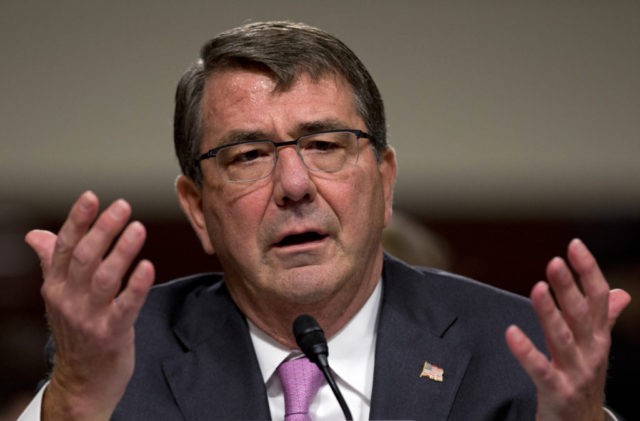The head of the United States Pacific Command, Admiral Harry B. Harris, Jr., testified before the House of Representatives in late April that the threat posed by North Korea has grown sufficiently to endanger the Hawaiian Islands. All around the globe, serious national security problems are coming to the fore in places like Iran, Venezuela, Afghanistan, and the South China Sea. Yet, because of holdover personnel from the Obama administration, and damaging Obama-era policies remaining in place, our military continues flailing.
On June 30, 2016, Secretary of Defense Ashton Carter announced that transgender service members would no longer be discharged from military service solely for being transgendered. Later, the Department of Defense (DOD) announced that as of July 1, 2017, transgender recruits would be accepted into the military. The DOD took these steps even though transgender personnel are likely to need medical, surgical, and psychological care that undermines their readiness for battle by rendering them non-deployable.
Acutely aware of the geopolitical problems we face, President Trump announced his intention to restore the strength of our military. Americans appreciated the priorities described by Secretary of Defense James Mattis during his confirmation hearing: mission readiness, command proficiency, and combat effectiveness. Unfortunately, the implementation of President Obama’s transgender policies did not consider the impact that “transitioning” personnel would have on military readiness and combat effectiveness.
The arguments used by the Obama Administration to support its transgender policy changes stemmed from a few politically correct reports produced by well-funded LGBT activist organizations. The first “study” was released in August 2013 by the pro-LGBT Williams Institute in partnership with the National Gay and Lesbian Task Force. The next March, a private, non-governmental “Transgender Military Service Commission,” headed by Surgeon General Jocelyn Elders, released a report through the pro-LGBT think tank, the Palm Center. These two private studies and the various government reports and directives that followed have not focused on how the new transgender policies will affect military readiness and war-fighting effectiveness – the core function of the armed forces. Nor were these policy changes mandated by the Congress. Rather, they were driven by bureaucratic reinterpretations of existing law. Given the magnitude of these changes, it would seem wise to halt the process and seek congressional guidance and statutory language.
In fact, just before the DOD issued the transgender policy change, the Center for Medicare and Medicaid Services refused to provide national coverage for gender reassignment surgery citing insufficient studies about the health outcomes of such surgeries and small sample sizes in the studies that have been conducted. However, DOD is now requiring taxpayers to foot the bill for gender reassignment surgery, with no benefit to the taxpayer or the military.
If implemented as planned, these transgender policies will require our military to assume the risks of recruiting and retaining persons who may require long-term medical treatment. Such procedures and physical changes often produce uncertain results associated with higher rates of depression and suicide. “Transitioning” service members require that the government bear the cost of hormone treatments, surgery, and post-operative care. This creates a tremendous incentive for individuals to join the military in order to receive the costly medical procedures associated with “transitioning,” since transgender individuals cannot be excluded from joining. And it’s difficult to see how any person undergoing this process would be deployable and combat-ready. What’s more, the time taken away from commanders’ combat-related duties while they take on the responsibilities of medical case workers is significant. It’s unfair to expect them to be judged on their ability to oversee medical-psychological cases like these.
We do welcome the Pentagon’s recent nullification of an October 2016 directive imposing “open-door” shower and bathroom guidelines on all DOD schools. But continuing implementation of Obama’s transgender policies ignores the strongly-felt concerns of women who do not want to be exposed to individuals of the opposite sex in facilities which offer minimal privacy. This is a particular problem when the incidence of rape in the military is so severe.
I received a letter from a known but confidential source in the naval service who asked me to inform the command structure in Washington about the damaging effects of these policies:
As part of the policy, CO’s must facilitate the requests of individuals for transgender treatment (surgery, cross-hormonal therapy, etc.)…. [O]nce the service member is considered “stable” in their preferred gender, and their “gender marker” is changed in a DoD database, they must be accommodated in the berthing and bathroom facilities of their preferred gender regardless of whether they still possess their opposite sex anatomy! (And most are expected to do so). Given the close living quarters that most military members have to share, this is particularly distressing to many of us, especially women.
These policies will ultimately undermine recruitment and retention.
Secretary Mattis must consider the many complex ramifications of these Obama-era policies that remain in effect. The DOD and the Congress need to ensure the priorities of the U.S. armed forces remain those that the Secretary has outlined: mission readiness, command proficiency, and combat effectiveness. Holdover personnel from the Obama Administration need to focus on these new priorities, and not on the last Administration’s social engineering projects that ignore military readiness.
Lt. Gen. (Ret.) William G. “Jerry” Boykin serves as Family Research Council’s executive vice president. He spent 36 years in the Army, serving his last four years as deputy undersecretary for intelligence in the Department of Defense.

COMMENTS
Please let us know if you're having issues with commenting.